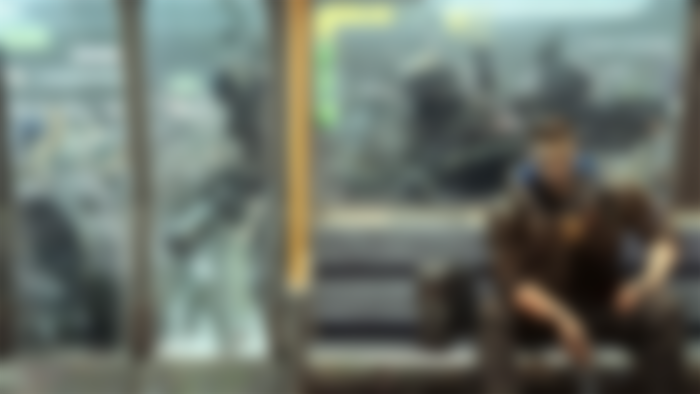Behind this title holding a little oxymoron hides the fight (final?) Between the States and the giants of the tech. Because today, says Anthony Poncier , doctor in social and political history who became a consultant in management and digital transformation, two futures seem to be possible. The first is the one imagined in Neuromancer by cyberpunk writer William Gibson. The second is that desired by Fernand Braudel, one of the fathers of modern history.

For the use of readers new to the subject, here is the definition given by Wikipedia of the term " cyberpunk ": " Cyberpunk (association of the words cybernetic and punk) is a genre of science fiction closely related to dystopia and hard science fiction. It often features a near future, with a technologically advanced society ”.
In many ways, the genre was defined by William Gibson in his writings of the early 1980s. His period novels, moreover, may have made their readers feel that the future was already written. So when Elon Musk founded Neuralink, his company aimed at creating neural implants (in other words, plugging the human brain into a machine), how can we not think of Johnny Mnemonic , a remarkable short story from Gibson which was later adapted to cinema with the very young Keanu Reeves at the casting? Johnny is a courier who carries various data in his brain on behalf of clients wishing to protect themselves from leaks or theft.
One wonders if William Gibson was not a visionary. Pessimistic certainly, but visionary all the same.
But what interests us especially in William Gibson is his flagship novel and founder of the cyberpunk movement (which won him three major science fiction prizes in 1984), Neuromancer , which will have a lasting influence on the genre, from Ghost in the Shell to Matrix for example. In this book, Gibson describes a futuristic society ruled by unbridled capitalism embodied by mega -corporations , including the famous Tessier-Ashpool . These mega-corporations, inspired by South Korean chaebols and zaibatsuJapanese, are so powerful that they feel above the law, have their own armies, control entire territories, and sometimes take the place of their governments.
Of course, GAFAM and BATX are not there yet, far from it. But what about Diem (ex-Libra), Facebook's crypto-currency project , when we know that producing a currency has long been a sovereign prerogative? And what about Google and its failed smart city project in a Toronto neighborhood which, according to the most alarmist observers , left the company in total control of this part of the city? Without speaking, of course, of the recurring criticism around the question of taxes, the majority of these groups finding a way to circumvent the tax pressure by their transnational aspect.
In view of the current evolution of these technological companies, their rise in power and their growth in increasingly large and varied markets, one can wonder if William Gibson was not a visionary . Pessimistic certainly, but visionary all the same.
The EU is working on directives aimed at regaining control of the European market in the face of technological platforms
Why talk about Fernand Braudel after William Gibson? Because beyond the role of multinationals, cyberpunk portrays states which are very often empty shells, without real power, or even outright “zombie states”. An imagination that has found a certain echo in reality. But Fernand Braudel, fifteen years before the first "great" novels of William Gibson, offers a vision, even a solution, capable of generating a different future, far from devastating monopolies and powerless states.
In his work Material Civilization, Economy and Capitalism (1967), Fernand Braudel explains that capitalism is not an ideology but an economic system developed around games of power strategies. Also, for him, capitalism aspires to monopoly but must be controlled by the action of the public powers.
We can see that recently, several States seem to react in a strong enough way to counter the positions considered too dominant of the large technological companies. In China for example, President Xi Jinping personally opposed the IPO of ANT Group, for political as well as economic reasons, the company managing all financial services of Ali Baba, the company headed by Jack Ma. The latter is thus "pushed back" quite brutally, and for an indefinite period.
In Europe, after the General Data Protection Regulation (GDPR) in 2018, the European Commission is preparing to unveil the Digital Market Act (a directive aimed at strengthening competition rights in digital markets) and the Digital Services Act (a directive on the regulation of platforms), texts aimed at regaining control of the European market in the face of technological platforms. Not to mention the question of taxing their income, still under discussion at the OECD .
Even in the United States, Google must now face legal proceedings for abuse of dominant position, following the publication of a report by a congressional committee that does not mince words on the subject of antitrust. Likewise, Facebook is being sued by the Federal trade commission (FTC) and 46 states calling for its dismantling . It can be assumed that these procedures are only the beginning of a long series, in the United States as in other countries.
So will our future be Gibsonian? Or does the return to favor of Braudelian philosophy among our leaders draw the possibility of another future? As always with the future, there are many paths that can be taken. What is certain, however, is that there are still many chapters to write in the novel of our reality.
Cyberpunk 2020: How We All Became Hackers
Forty years after the invention of cyberspace and the Neuromancer tornado (William Gibson's novel published in 1984, editor's note) , and a few weeks before the release of the highly anticipated Cyberpunk 2077 video game , it's time to look into the imagination cyberpunk. On how it was able to both unravel over the years and materialize in the days of GAFA.

Cyberpunk is above all an imagination. Close your eyes and think of Ridley Scott's Blade Runner . A city, sprawling, dark, raining on - yes, it always rains in the cyberpunk world. A blocked sky - color TV set on an out-of-service transmitter to use Neuromancer's - or better, an orange sky like the one that dominated San Francisco incipit on September 9th. Screens, everywhere, and neon lights, to pierce the darkness of the sky and the city walls. Advertisements as if the whole city has turned into a gigantic Times Square and if ultimately the most important thing is to consume electronics and ramen - yes, we still eat Japanese food in the cyberpunk world. And finally robots, droids, replicants, flying and autonomous cars. Technology everywhere, to show that if this world has gained in practicality, it has especially lost in humanity.
In cyberpunk, the hero is a hacker, a pirate, a "virtual samurai", for like Neal Stephenson, the author of the classic Snow Crash . In this dark universe, the too common people disappear, drowned in an electronic daily life and delivered to the gigantic corporations which dominate the world. Those too dumb to play with the system (s) are quickly crushed or scattered to the winds by an explosion of nanobots - re-read Bud's story in The Diamond Age , Neal's other must-read novel Stephenson. Only the smartest, the most technologically adapted survive. Those who can read the Matrix - like Neo in the Matrix trilogy - and hack the heart of the system. Case in Neuromancer, Hiro in Snow Crash and possibly Deckard inBlade Runner .
The domination of GAFA is more subtle, more insidious than that of mega-corporations in cyberpunk megalopolises
To survive in a world of chaos led, controlled by multinational media and technology companies (the Tyrell Corp of Blade Runner ), you have to successfully infiltrate the code, rewrite it, recompile it to create your own universe. Cyberpunk is a praise of hacking, of bending the rules, where only the most gifted survive. Neuromancer , the bible of the genre, dates from 1984. Blade Runner imagined his hunt for humanoid robots in 1999. And today, in 2020, to what extent has the cyberpunk imagination “come true”?If William Gibson and his cronies were right about the rise of multinationals that dominate the world, they got it wrong. Of course, the GAFA are there, omnipresent in our daily lives, and their inclinations to invest all sectors of our life., to create artificial intelligences and robots, could well compete with the dark imaginaries of the beginning of the 1980s. But their domination is more subtle, more insidious than that present in the cyberpunk megalopolises. It goes through a kind of voluntary servitude in our digital uses. We depend on Google, Facebook, or Microsoft for many aspects of our lives. Few of those today could, overnight, do without the benefits of Google Maps to find their way around or Messenger to chat with their friends. The influence of GAFA goes through data and service. An invisible domination, far from the violence of science fiction novels. As such, the reference book corresponding to this imaginary would undoubtedly be more Le Cercle.by Dave EggersDo Androids Dream of Electric Sheep? by Philip K. Dick.
Cyberpunk of 2020 is normal, transparent, invisible, with little or no impact on our daily lives. He doesn't see himself.
If cyberpunk is often seen today as an old-fashioned fantasy, it is because appearances are deceptive. We retain the images. And apart from a few shots of Chinese cities, the dark streets evoked in science fiction novels don't really exist today. Paris, no more than London or San Francisco, does not resemble the “Conurb” of Neuromancer . Screens invade the streets, of course, but they are much more discreet than the Atari advertisements pictured by Ridley Scott. Our environment has not changed that much in forty years: the streets still look like those of yesteryear and animals still have a place there - but for how long? The technology we were promised spectacular and ubiquitous has become more discreet: no one had imaginedthe smartphone , this permanent connection and tracking tool, which digitizes our lives more than any robot or autonomous vehicle. Our cyberpunk is normal, transparent, invisible, with little or no impact on our daily lives. The cyberpunk of the 2020s is not seen.
In 2020, virtual samurai no longer exist, or they have no impact
In this normal world, what remains of the heroes, of those who knew how to decode the matrix? They too have disappeared, becoming as useless as the imagination of the cities in which they lived. In 2020, virtual samurai no longer exist, or they have no impact. Better yet, everyone has become a hacker. By interfering in our daily lives, the cyber revolution has swept away technical language. We all have in our pockets the necessary to hack the system, and these same multinationals that enslave us also provide us with the tools of protest. You don't need very advanced technical knowledge to drown in K-pop videos the informing tools put in place by the Dallas police. You don't need to know a line of code tohijack Donald Trump's speeches for a lip-sync .
System hacks are now the work of ordinary users. Blame it on a digital world that has become accessible, malleable, and manipulable by all. By opening their interfaces to billions of users, GAFA have also opened wider the doors of entry to the gigantic digital club, and where it was previously necessary to know the technique and the mysteries of the platforms to control them, they have created a kind of common digital language. Everyone speaks Instagram, everyone knows how to send an SMS or a file, everyone "speaks" video ...
The GAFA have also provided us with the necessary tools for this formidable diversion. Each of us has in our pockets a rectangle of metal much more powerful than the computers that sent man to the moon. A smartphone that can be used to share, locate, create shared access like in the days of the “Arab Spring” . Anyone can, at some point, try to play with digital tools. But hacking is precisely playing with tools. And today the elements of the game are accessible to everyone.
Last August, we discovered that American Amazon delivery men were hanging their smartphones on trees , near warehouses, to be the first to take an order. A hack, again. In a way, these smartphone trees are the new landscapes of cyberpunk.

